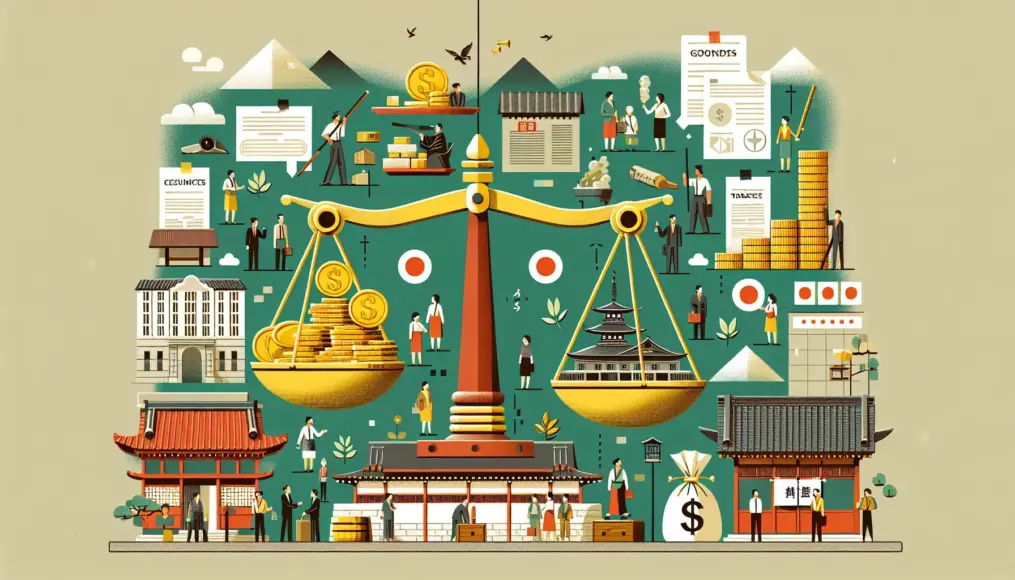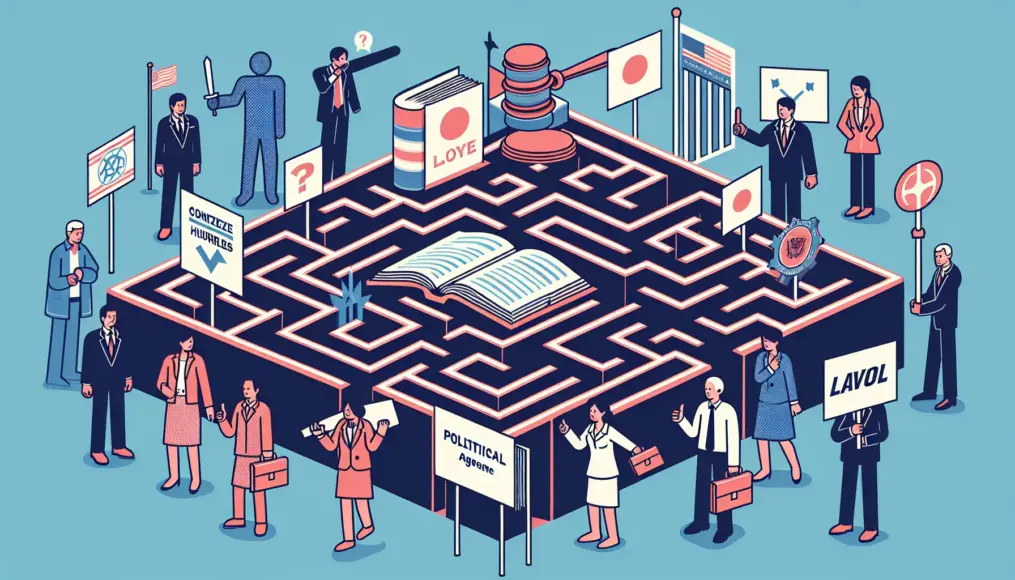When we think about the introduction of sales tax, it’s natural to wonder how it has influenced our everyday lives and the broader economy. Understanding the economic conditions in Japan leading up to the implementation of sales tax and the reasons behind its necessity can shed light on how our lives have changed since then.
In this article, we will delve into the process of introducing sales tax and explore its subsequent effects. We’ll examine the changes experienced by consumers and businesses, as well as present the opinions of both proponents and opponents within the political debates surrounding this issue. By looking back at history, we can also reflect on what the future of tax policy might hold.
- The background of sales tax introduction is closely tied to the post-war economic conditions in Japan.
- The process leading to the enactment of the sales tax law and its significance.
- Specific impacts on consumers and businesses after its introduction.
The Background of Introducing Consumption Tax in Japan
Understanding the history leading up to the introduction of consumption tax is crucial for grasping the evolution of Japan’s economy. In the post-war period, Japan experienced rapid economic growth, which brought about an increasing demand for social security and enhanced public services. It was against this backdrop that the necessity for implementing a consumption tax emerged.
To stabilize the economy, new sources of revenue were needed. Consumption tax gained attention as a viable means to collect revenue from the general public, sparking discussions about its implementation. Let’s take a closer look at the specific economic conditions that prompted the introduction of the consumption tax.
Economic Conditions in Post-War Japan
After World War II, Japan entered a phase of recovery and growth. The country began to rebound from the economic devastation caused by the war, and the standard of living for its citizens started to improve. However, this economic growth also led to increased demand for public services. In this context, the need for sustainable economic policies became apparent.
One of the reasons for the push toward tax reform was the reality that revenue from income tax and corporate tax alone was insufficient to meet the financial needs. Consumption tax was viewed as a way to secure stable revenue, highlighting the necessity of its introduction.
- Post-war Japan saw economic growth alongside rising demand for public services
- The shortage of tax revenue underscored the need for consumption tax
- The necessity for sustainable economic policies became increasingly urgent
The Necessity of Introducing Consumption Tax
There was an expectation that the introduction of consumption tax would secure stable revenue. Particularly, since consumption tax can be collected broadly from the general populace, it allows for a distribution of the financial burden. This characteristic helps avoid placing excessive strain on specific demographic groups.
Moreover, the introduction of consumption tax was aligned with international trends. Many developed countries had already adopted consumption tax, and Japan needed to follow suit with tax reform to stay in line with global practices. Thus, the implementation of consumption tax became a significant option in Japan’s economic policy landscape.
For those interested in this topic, we recommend checking out this article: “What Impact Did Postal Privatization Have on Japanese Society?”. It offers a detailed analysis of how postal privatization has influenced Japan’s economy and society, delving into the background and effects of policy changes to enhance your understanding.
- Consumption tax is a means to secure stable revenue
- It allows for the distribution of financial burden, avoiding excessive impact on specific groups
- Part of tax reform in line with international trends
The Introduction of Consumption Tax in Japan
The process of introducing a consumption tax marked a significant milestone in Japan’s economic policy. It’s crucial that the voices of the government, the parliament, and the citizens are reflected in the policymaking process. Understanding how the consumption tax bill came to fruition sheds light on our current tax system.
Let’s delve into how discussions and negotiations surrounding the consumption tax unfolded, as well as the challenges and reactions faced throughout the passage of the bill.
The Policy Decision Process
The decision-making process for implementing the consumption tax was complex, involving many stakeholders. Initially, discussions within the government were prompted by changes in the economic landscape. Experts and bureaucrats came together to debate the necessity of the consumption tax and its potential impacts, eventually crafting a concrete proposal.
Once the proposal was ready, the government submitted it to the Diet, but discussions did not progress smoothly. There were notable disagreements among political parties, and public backlash also played a significant role, causing delays in the decision-making process. After much deliberation, a consensus was finally reached on the introduction of the consumption tax.
- The consumption tax discussion started within the government.
- Disagreements among political parties and public resistance influenced the process.
- Reaching a consensus took considerable time.
The Passage of the Consumption Tax Bill
The successful passage of the consumption tax bill was the culmination of the policy decision process. After lengthy debates in the Diet, the bill ultimately passed, but not without significant discussion. Debates particularly focused on the tax rate and its applicability, with a variety of opinions being expressed.
Even after the bill’s passage, concerns about the impacts of the consumption tax remained prevalent. Preparation for its implementation and efforts to inform the public were necessary to foster understanding among citizens. This entire process highlights that the introduction of the consumption tax was not merely a tax change; it was a significant event with widespread implications for society as a whole.
For those interested in gaining a deeper understanding of the consumption tax, I recommend this article: “Considering the Future of Public Pension Systems! Predicting Their Roles and Impacts.” This piece explores how economic policies affect society, particularly focusing on the sustainability and importance of the pension system. It serves as a valuable resource for grasping the broader societal impacts of tax changes.
- The passage of the consumption tax bill was the culmination of the policy decision process.
- There were extensive discussions during the Diet debates.
- Efforts to deepen public understanding were essential post-implementation.
Impact on Society After the Introduction of Consumption Tax
The introduction of consumption tax has had a significant impact on our society, particularly felt by consumers and businesses alike. This change in the tax system goes beyond mere numbers; it intertwines deeply with our daily lives and economic activities.
In this section, we will explore how consumers have been affected and the changes businesses have faced. Understanding the implications of consumption tax will provide valuable insights into future tax policies and economic frameworks.
Effects on Consumers
After the consumption tax was implemented, consumers experienced direct and noticeable effects. First and foremost, a general rise in prices was anticipated, and indeed, many goods and services saw their costs increase. As a result, consumers faced higher living expenses, leading to a greater sense of financial strain on household budgets.
Additionally, consumers altered their purchasing behaviors. With rising prices on their minds, many became more cautious about their spending, opting for cheaper alternatives or delaying necessary purchases. These shifts in consumer behavior, in turn, influenced the broader economy.
- Price increases due to the introduction of consumption tax impacted consumers
- Heightened financial strain on household budgets
- Changes in purchasing behavior affecting the economy
Effects on Businesses
The introduction of consumption tax also brought significant challenges for businesses. One major impact was the need to reconsider pricing strategies to account for the tax. This necessity forced companies to adapt, resulting in shifts within the competitive landscape.
Furthermore, new procedures for collecting and remitting the consumption tax added to the administrative burden for businesses. This was especially challenging for small and medium-sized enterprises, where the costs associated with tax compliance became a pressing concern. Consequently, businesses were compelled to seek more efficient operational practices.
Understanding how the consumption tax affects our economy is crucial for contemplating future tax policies and economic strategies. If you’re interested, check out this article on the “Cultural Impact of Economic Stimulus and Its History.” It delves into how economic stimulus measures have influenced not just the economy, but also cultural aspects, making it a worthwhile read.
- Businesses had to rethink their pricing strategies
- Tax procedures impacted administrative operations
- For small businesses, tax compliance costs became a significant issue
Political Debate Surrounding Consumption Tax
The introduction of a consumption tax has sparked a variety of discussions in the political arena. Opinions from both supporters and opponents clash, each backed by valid reasoning. These debates provide essential perspectives for understanding the implications of a consumption tax.
In this section, we will delve into the arguments from both sides—those opposing the consumption tax and those in favor. By grasping the logic behind each stance, you can deepen your understanding of the consumption tax and its potential effects.
Arguments Against the Tax
Opponents of the consumption tax particularly emphasize its impact on daily life. Concerns have been raised that the introduction of such a tax would lead to rising prices, disproportionately burdening low-income and middle-class individuals. This could exacerbate feelings of financial strain and potentially widen social inequality.
Moreover, since the consumption tax is an indirect tax, there are fears that it may lead to a decline in consumer spending. If consumers cut back on their expenditures, there could be negative repercussions for the overall economy, making sustainable growth more challenging.
- Opponents stress the tax’s impact on daily life
- Rising prices would disproportionately burden low-income individuals
- There’s a risk of declining consumer spending
Supporters’ Perspective
On the flip side, supporters of the consumption tax argue that ensuring stable tax revenue is a significant benefit. Since the consumption tax can be collected broadly across the population, it avoids placing excessive burdens on specific groups. This stability in revenue can help secure funding for public services and social welfare programs.
Additionally, proponents point out that the consumption tax aligns with international trends, as many other developed countries have implemented similar systems. By adopting this approach, Japan could maintain its economic competitiveness globally and pursue sustainable growth.
For those interested in further exploring the discussion about taxes and social systems, we recommend the article “Future Outlook of the National Pension System: Key Points to Know.” Understanding the current state and potential changes in the national pension system can help you consider the broader implications of the consumption tax.
- Supporters emphasize the importance of stable tax revenue
- The tax avoids placing excessive burdens on specific groups
- It’s part of an economic policy aligned with international trends
Conclusion
The introduction of the consumption tax marked a significant turning point in Japan’s economic policy. With the post-war economic boom, the need for stable tax revenue became increasingly apparent, leading to the implementation of this tax system. While it has had a profound impact on citizens’ daily lives and corporate management, it has also sparked a heated political debate with divided opinions.
For consumers, concerns about rising prices and increased living costs have taken center stage, while businesses have been prompted to reevaluate their management strategies. On the flip side, supporters argue that stable tax revenue contributes to the enhancement of public services. By understanding the process of implementing the consumption tax and its ramifications, we can gain valuable insights into future tax policies.
- The consumption tax was introduced against the backdrop of post-war economic growth.
- It has impacted living costs and required businesses to adjust their strategies.
- Stable tax revenue contributes to the improvement of public services.
Gaining a deeper understanding of the consumption tax allows us to reflect on its effects on our daily lives. We would love to hear your thoughts and opinions in the comments!



Comment